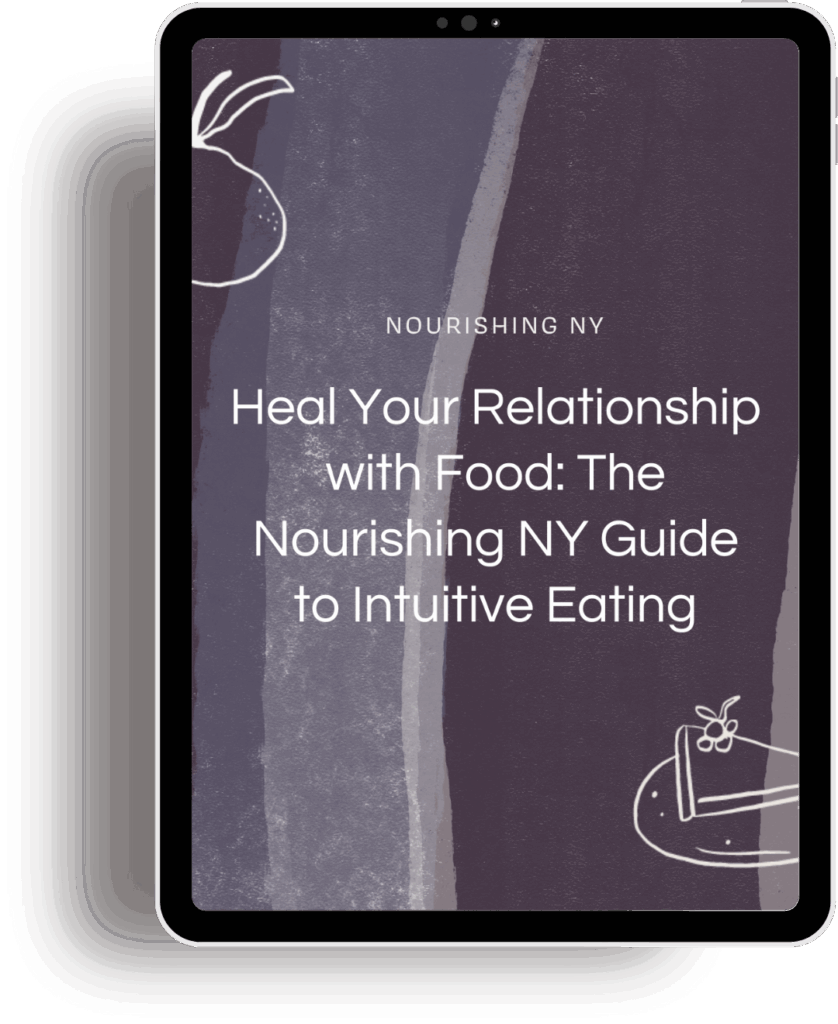Nutritional rehabilitation is a crucial part of eating disorder treatment, and it affects both mental and physical wellbeing. For that reason, registered dietitians play a major role in the treatment of individuals who suffer from eating disorders. Eating disorder treatment is most effective when using a multidisciplinary team based approach. Meaning, providing a client with a team of providers such as a dietitian, medical doctor, and psychotherapist that are able to provide expertise in every area of treatment. Here at Nourishing NY, our team of Registered Dietitians are specialized in providing support for eating disorders in NYC catered to each client’s specific recovery needs.
Understanding Eating Disorders
An eating disorder is a complex mental illness that affects both emotional and physical health. This diagnosis is defined by having an unhealthy relationship with food, weight, and physical appearance. There are a wide range of conditions that fall under this category- including anorexia nervosa, bulimia nervosa, binge-eating disorder, ARFID, and a few others. Eating disorders can affect individuals of any age, race, ethnicity, and gender. The development of eating disorders is often triggered by both genetic and societal factors. People can be more susceptible to EDs if there is a family or personal history of addiction, eating disorders, anxiety, depression, OCD. Another main influence is the societal pressures within the weight loss industry, encouraging extreme dieting that can escalate into disordered eating or an eating disorder.
Role of Dietitians in Eating Disorder Treatment
Registered Dietitians play a crucial role in the treatment of eating disorders by working with clients to create meal plans, provide nutrition education, ensure adequate portion sizing, and challenge disordered food beliefs. Dietitians are also involved in ensuring clients restore to an appropriate body weight when needed in a safe and stable way. RDs work closely with primary care providers, therapists, psychiatrists, and any other provider that might be on the treatment team. Dietitians for eating disorders also communicate closely with other levels of care when needed, to ensure that a step up or step down within treatment centers is as seamless as possible.
Comprehensive Nutritional Assessment
During the initial session dietitians will conduct a nutrition assessment to determine the severity of the eating disorder. In detail, RDs will review a dietary recall to understand the client’s overall intake, including food access, components of meals/snacks, and quantity of food intake. Eating behaviors will also be assessed such as social interactions regarding food and willingness to provide food for themselves exhibited in grocery shopping and/or cooking. Last, we will analyze labs/anthropometric data to determine the medical stability of the client, taking into account medical history and any other comorbid diagnoses. Our team of dietitians for eating disorders at Nourishing NY have expertise in conducting these assessments, where we can identify nutritional deficiencies and disordered eating patterns, to therefore individualize nutrition goals catered toward each client.
Individualized Meal Planning and Support
There is no one size fits all plan when it comes to food and nutrition. Every nutrition goal set here at Nourishing NY with our dietitian for eating disorders is specifically catered to each client and what they need at the moment. These plans are also ever changing, constantly adapted to the progress the client makes at whatever rate that may be. Meal planning aside, Nourishing NY also offers education on balanced eating, and practical strategies for managing challenging food-related situations.
Addressing Food and Body Image Concerns
Part of recovery from an eating disorder also typically includes navigating body image concerns and repairing the relationship one has with their body. Our dietitians provide non-judgemental support and compassion when working through body image healing. Nourishing NY believes that this can be obtained by fostering body positivity/neutrality, challenging diet culture, and promoting self acceptance through all stages of recovery.
Supporting Long-Term Recovery and Wellness
There are many stages of recovery, ranging from inpatient, residential, partial hospitalization, intensive outpatient, and outpatient care. Registered dietitians NYC are involved at every point in eating disorder treatment. There are many cases when dietitians for eating disorders are involved in recovery long term, well past a client’s ability to live a recovered life. Having the long term support of a dietitian can help navigate whatever life has in store, knowing the client has resources to feel supported without the need to fall back on the eating disorder. Nourishing NY dietitian’s are here to provide that long term support, to help monitor and navigate recovery to promote sustained progress and prevent relapse.
Contact us today to schedule a consultation with one of our dietitians for eating disorders and take the step toward recovery



